Linh Le
Leveraging Semantic Type Dependencies for Clinical Named Entity Recognition
Mar 07, 2025



Abstract:Previous work on clinical relation extraction from free-text sentences leveraged information about semantic types from clinical knowledge bases as a part of entity representations. In this paper, we exploit additional evidence by also making use of domain-specific semantic type dependencies. We encode the relation between a span of tokens matching a Unified Medical Language System (UMLS) concept and other tokens in the sentence. We implement our method and compare against different named entity recognition (NER) architectures (i.e., BiLSTM-CRF and BiLSTM-GCN-CRF) using different pre-trained clinical embeddings (i.e., BERT, BioBERT, UMLSBert). Our experimental results on clinical datasets show that in some cases NER effectiveness can be significantly improved by making use of domain-specific semantic type dependencies. Our work is also the first study generating a matrix encoding to make use of more than three dependencies in one pass for the NER task.
Representation Engineering for Large-Language Models: Survey and Research Challenges
Feb 24, 2025Abstract:Large-language models are capable of completing a variety of tasks, but remain unpredictable and intractable. Representation engineering seeks to resolve this problem through a new approach utilizing samples of contrasting inputs to detect and edit high-level representations of concepts such as honesty, harmfulness or power-seeking. We formalize the goals and methods of representation engineering to present a cohesive picture of work in this emerging discipline. We compare it with alternative approaches, such as mechanistic interpretability, prompt-engineering and fine-tuning. We outline risks such as performance decrease, compute time increases and steerability issues. We present a clear agenda for future research to build predictable, dynamic, safe and personalizable LLMs.
Can ChatGPT Diagnose Alzheimer's Disease?
Feb 10, 2025Abstract:Can ChatGPT diagnose Alzheimer's Disease (AD)? AD is a devastating neurodegenerative condition that affects approximately 1 in 9 individuals aged 65 and older, profoundly impairing memory and cognitive function. This paper utilises 9300 electronic health records (EHRs) with data from Magnetic Resonance Imaging (MRI) and cognitive tests to address an intriguing question: As a general-purpose task solver, can ChatGPT accurately detect AD using EHRs? We present an in-depth evaluation of ChatGPT using a black-box approach with zero-shot and multi-shot methods. This study unlocks ChatGPT's capability to analyse MRI and cognitive test results, as well as its potential as a diagnostic tool for AD. By automating aspects of the diagnostic process, this research opens a transformative approach for the healthcare system, particularly in addressing disparities in resource-limited regions where AD specialists are scarce. Hence, it offers a foundation for a promising method for early detection, supporting individuals with timely interventions, which is paramount for Quality of Life (QoL).
Can Safety Fine-Tuning Be More Principled? Lessons Learned from Cybersecurity
Jan 19, 2025Abstract:As LLMs develop increasingly advanced capabilities, there is an increased need to minimize the harm that could be caused to society by certain model outputs; hence, most LLMs have safety guardrails added, for example via fine-tuning. In this paper, we argue the position that current safety fine-tuning is very similar to a traditional cat-and-mouse game (or arms race) between attackers and defenders in cybersecurity. Model jailbreaks and attacks are patched with bandaids to target the specific attack mechanism, but many similar attack vectors might remain. When defenders are not proactively coming up with principled mechanisms, it becomes very easy for attackers to sidestep any new defenses. We show how current defenses are insufficient to prevent new adversarial jailbreak attacks, reward hacking, and loss of control problems. In order to learn from past mistakes in cybersecurity, we draw analogies with historical examples and develop lessons learned that can be applied to LLM safety. These arguments support the need for new and more principled approaches to designing safe models, which are architected for security from the beginning. We describe several such approaches from the AI literature.
EEG-SSM: Leveraging State-Space Model for Dementia Detection
Jul 25, 2024



Abstract:State-space models (SSMs) have garnered attention for effectively processing long data sequences, reducing the need to segment time series into shorter intervals for model training and inference. Traditionally, SSMs capture only the temporal dynamics of time series data, omitting the equally critical spectral features. This study introduces EEG-SSM, a novel state-space model-based approach for dementia classification using EEG data. Our model features two primary innovations: EEG-SSM temporal and EEG-SSM spectral components. The temporal component is designed to efficiently process EEG sequences of varying lengths, while the spectral component enhances the model by integrating frequency-domain information from EEG signals. The synergy of these components allows EEG-SSM to adeptly manage the complexities of multivariate EEG data, significantly improving accuracy and stability across different temporal resolutions. Demonstrating a remarkable 91.0 percent accuracy in classifying Healthy Control (HC), Frontotemporal Dementia (FTD), and Alzheimer's Disease (AD) groups, EEG-SSM outperforms existing models on the same dataset. The development of EEG-SSM represents an improvement in the use of state-space models for screening dementia, offering more precise and cost-effective tools for clinical neuroscience.
Federated Artificial Intelligence for Unified Credit Assessment
May 20, 2021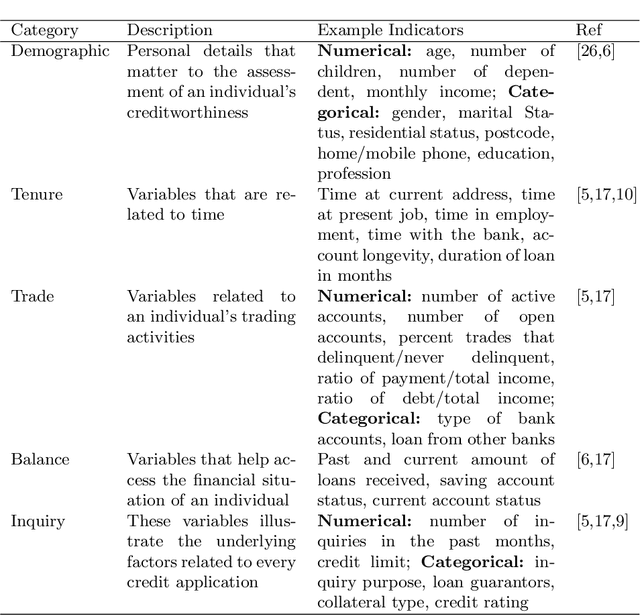
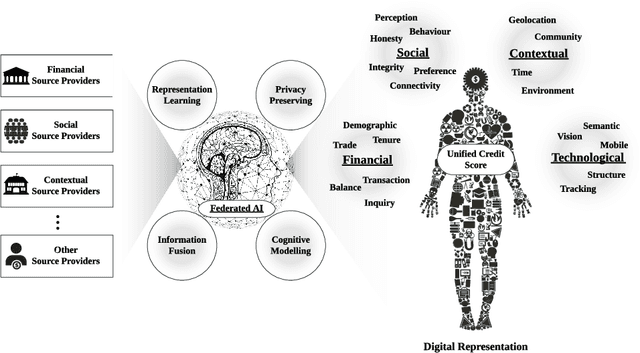
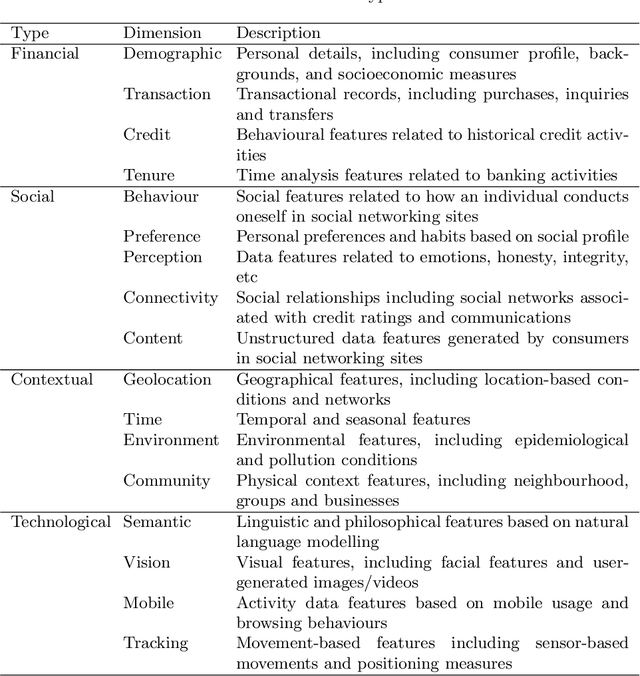
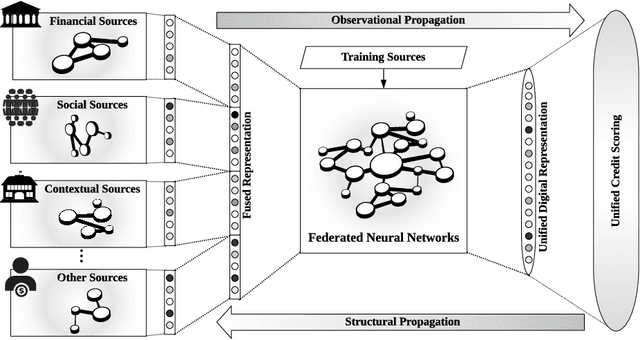
Abstract:With the rapid adoption of Internet technologies, digital footprints have become ubiquitous and versatile to revolutionise the financial industry in digital transformation. This paper takes initiatives to investigate a new paradigm of the unified credit assessment with the use of federated artificial intelligence. We conceptualised digital human representation which consists of social, contextual, financial and technological dimensions to assess the commercial creditworthiness and social reputation of both banked and unbanked individuals. A federated artificial intelligence platform is proposed with a comprehensive set of system design for efficient and effective credit scoring. The study considerably contributes to the cumulative development of financial intelligence and social computing. It also provides a number of implications for academic bodies, practitioners, and developers of financial technologies.
ReINTEL: A Multimodal Data Challenge for Responsible Information Identification on Social Network Sites
Dec 16, 2020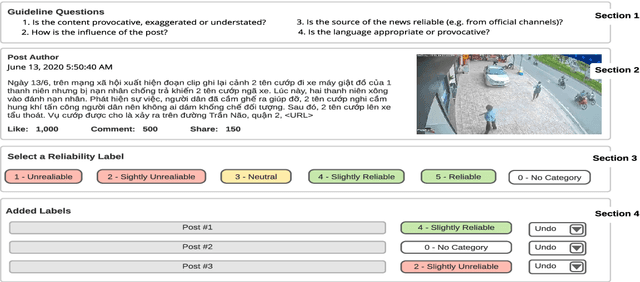
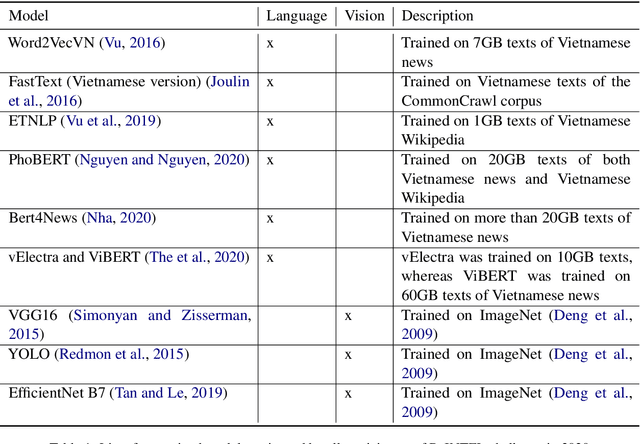
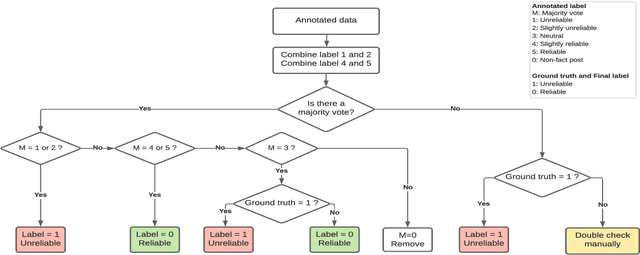
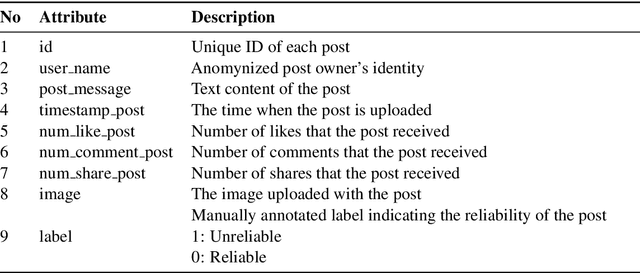
Abstract:This paper reports on the ReINTEL Shared Task for Responsible Information Identification on social network sites, which is hosted at the seventh annual workshop on Vietnamese Language and Speech Processing (VLSP 2020). Given a piece of news with respective textual, visual content and metadata, participants are required to classify whether the news is `reliable' or `unreliable'. In order to generate a fair benchmark, we introduce a novel human-annotated dataset of over 10,000 news collected from a social network in Vietnam. All models will be evaluated in terms of AUC-ROC score, a typical evaluation metric for classification. The competition was run on the Codalab platform. Within two months, the challenge has attracted over 60 participants and recorded nearly 1,000 submission entries.
Deep Embedding Kernel
Apr 16, 2018
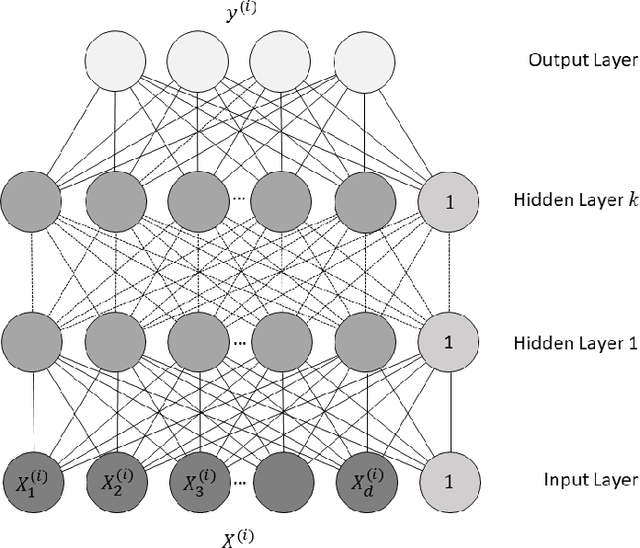
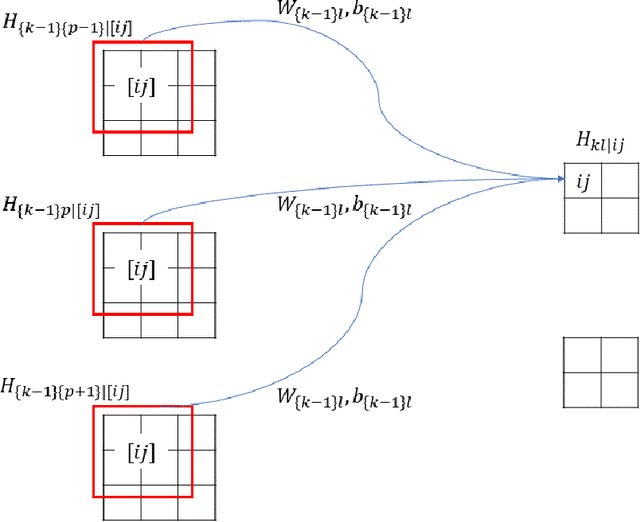

Abstract:In this paper, we propose a novel supervised learning method that is called Deep Embedding Kernel (DEK). DEK combines the advantages of deep learning and kernel methods in a unified framework. More specifically, DEK is a learnable kernel represented by a newly designed deep architecture. Compared with pre-defined kernels, this kernel can be explicitly trained to map data to an optimized high-level feature space where data may have favorable features toward the application. Compared with typical deep learning using SoftMax or logistic regression as the top layer, DEK is expected to be more generalizable to new data. Experimental results show that DEK has superior performance than typical machine learning methods in identity detection, classification, regression, dimension reduction, and transfer learning.
 Add to Chrome
Add to Chrome Add to Firefox
Add to Firefox Add to Edge
Add to Edge